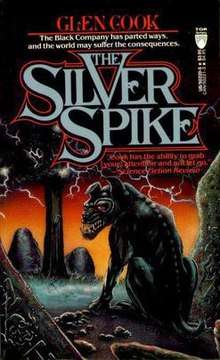The Silver Spike
The Silver Spike is a spin-off novel from Glen Cook's The Black Company. The story combines elements of epic fantasy and dark fantasy as it follows two former members of The Black Company and the formerly renowned "White Rose" down their own path after parting ways with the company following the events at the conclusion of The White Rose.
 | |
| Author | Glen Cook |
|---|---|
| Cover artist | Keith Berdak |
| Country | United States |
| Language | English |
| Series | The Black Company |
| Genre | Epic fantasy, Dark fantasy |
| Publisher | Tor Fantasy |
Publication date | September 1989 |
| Media type | Print (Paperback) |
| Pages | 313 |
| ISBN | 0-8125-0220-5 |
| OCLC | 20269842 |
Plot summary
The Dominator was a wizard of immense power who could not be killed by his enemies. He was, however, defeated and his evil essence imprisoned in a silver spike. The power inherent in the spike is so greatly feared and desired that some try to steal it, while others try to keep it from falling into anyone's hands.
Characters in "The Silver Spike"
Spike Hunters
- Tully Stahl
- Smeds Stahl – Tully's cousin
- Old Man Fish (Forto Reibus)
- Timmy Locan
The White Rose Rebellion
- Darling (Tonie Fisk) – The White Rose
- Silent – Wizard formerly of The Black Company
- Bomanz the Wakener (Seth Chalk)
- Brother Bear Torque
- Donkey Dick “Stubby” Torque
- Paddlefoot Torque
The Northern Empire
- Brigadier Wildbrand
- Gossamer – Wizard and Spidersilk's twin
- Spidersilk
- Exile – Imperial wizard from Charm
Others
- Philodendron Case (the narrator)
- Raven – formerly of The Black Company
- Toadkiller Dog
- The Limper – one of The Ten Who Were Taken
gollark: <@126590786945941504> Maybe they should.
gollark: What makes them better than the advertising companies then?
gollark: I am leaving off the second half so as not to fill more than a screen or so.
gollark: No, Richard, it's 'Linux', not 'GNU/Linux'. The most important contributions that the FSF made to Linux were the creation of the GPL and the GCC compiler. Those are fine and inspired products. GCC is a monumental achievement and has earned you, RMS, and the Free Software Foundation countless kudos and much appreciation.Following are some reasons for you to mull over, including some already answered in your FAQ.One guy, Linus Torvalds, used GCC to make his operating system (yes, Linux is an OS -- more on this later). He named it 'Linux' with a little help from his friends. Why doesn't he call it GNU/Linux? Because he wrote it, with more help from his friends, not you. You named your stuff, I named my stuff -- including the software I wrote using GCC -- and Linus named his stuff. The proper name is Linux because Linus Torvalds says so. Linus has spoken. Accept his authority. To do otherwise is to become a nag. You don't want to be known as a nag, do you?(An operating system) != (a distribution). Linux is an operating system. By my definition, an operating system is that software which provides and limits access to hardware resources on a computer. That definition applies whereever you see Linux in use. However, Linux is usually distributed with a collection of utilities and applications to make it easily configurable as a desktop system, a server, a development box, or a graphics workstation, or whatever the user needs. In such a configuration, we have a Linux (based) distribution. Therein lies your strongest argument for the unwieldy title 'GNU/Linux' (when said bundled software is largely from the FSF). Go bug the distribution makers on that one. Take your beef to Red Hat, Mandrake, and Slackware. At least there you have an argument. Linux alone is an operating system that can be used in various applications without any GNU software whatsoever. Embedded applications come to mind as an obvious example.
gollark: Oh, wait, better idea.
External links
- The Silver Spike at the Internet Book List
- The Silver Spike title listing at the Internet Speculative Fiction Database
This article is issued from Wikipedia. The text is licensed under Creative Commons - Attribution - Sharealike. Additional terms may apply for the media files.